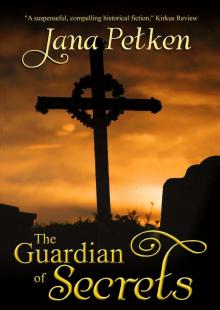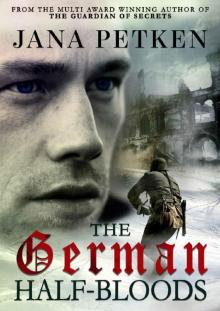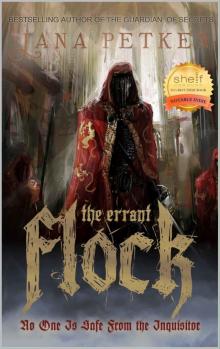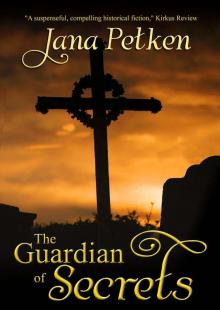- Home
- Jana Petken
The Guardian of Secrets and Her Deathly Pact
The Guardian of Secrets and Her Deathly Pact Read online
Second Edition
First Published July 2013
Copyright Jana Petken 2014
Jana Petken has asserted her moral right to be identified as the author of this work in accordance with the Copyright, Designs and Patents Act 1988. No part of this book may be reprinted, or in any way replicated without the permission of the author.
Any people depicted in stock imagery provided by Thinkstock are models, and such images are being used for illustrative purposes only.
Certain Stock imageryThinkstock
Because of the dynamic nature of the internet, any web address or links contained in this book may have changed since publication and may no longer be valid. The views expressed in this work are solely those of the author, in regard to the view of the characters, and the author hereby disclaims any responsibility for them.
Blue Ink Review
Debut novelist Jana Petken delivers a powerful family epic that chronicles the travails of a British woman and her family during the Spanish Civil War.Recently wedded, Celia Merrill Dobbs' initial expectations of marital bliss quickly dissolve in 1912, when her husband Joseph reveals he has married her only to inherit her wealthy father's prosperous farm in the English countryside. After Celia discovers that Joseph is her father's killer, she and their newborn son Peter escape to Spain.
In Spain, she lives with the Martinéz family, aristocratic landholders in Valencia. Celia becomes enamored with widower Ernesto Martinéz. They soon marry and raise their four children amid rising political tensions gripping the country.
Petken masterfully moves the gripping action along by creating credible characters and suspenseful plot twists. Writing in a straightforward manner and infusing scenes with details that inform but don't overwhelm, she portrays each of the characters' efforts to survive while coming to terms both with the horrors of wartime and personal bouts with excessive pride and passion.
Though the action is grounded in a particular time and place, the novel's concerns are universal, as typified when Celia's daughter ruminates on whether Spain would eventually "look back and feel proud of a war that had killed hundreds of thousands...or would it feel as she did now, betrayed by men with selfish political ambitions and lust for power." Despite its length, the captivating story succeeds brilliantly and becomes an unforgettable page-turner.
This is a must-read for historical fiction fans.
Also available from Jana Petken:
The Mercy Carver Series:
Dark Shadows
Also Coming December 2014:
Blood Moon
Table of Contents
Acknowledgements
Prologue
Part One
Chapter 1
Chapter 2
Chapter 3
Chapter 4
Chapter 5
Chapter 6
Chapter 7
Chapter 8
Chapter 9
Chapter 10
Chapter 11
Chapter 12
Chapter 13
Chapter 14
Chapter 15
Chapter 16
Chapter 17
Chapter 18
Chapter 19
Chapter 20
Chapter 21
Chapter 22
Chapter 23
Chapter 24
Part Two
Chapter 25
Chapter 26
Chapter 27
Chapter 28
Chapter 29
Chapter 30
Chapter 31
Chapter 32
Chapter 33
Chapter 34
Chapter 35
Chapter 36
Chapter 37
Part three
Chapter 38
Chapter 39
Chapter 40
Chapter 41
Chapter 42
Chapter 43
Chapter 44
Chapter 45
Chapter 46
Chapter 47
Chapter 48
Chapter 49
Chapter 50
Chapter 51
Chapter 52
Chapter 53
Chapter 54
Chapter 55
Chapter 56
Chapter 57
Chapter 58
Chapter 59
Chapter 60
Chapter 61
Chapter 62
Chapter 63
Chapter 64
Chapter 65
Chapter 66
Chapter 67
Chapter 68
Chapter 69
Chapter 70
Chapter 71
Chapter 72
Chapter 73
Chapter 74
Chapter 75
Chapter 76
Chapter 77
Chapter 78
Chapter 79
Chapter 80
Chapter 81
Chapter 82
Chapter 83
Chapter 84
Chapter 85
Chapter 86
Chapter 87
Chapter 88
About the Author
Acknowledgements
To the men and women killed during the Spanish Civil War, 1936–1939.
To the survivors who rebuilt Spain with determination and courage.
To all those killed and forced into exile after the war and to those who suffered imprisonment under General Franco’s rule.
To the kind elderly men and women who graced me with stories of their own civil war experiences. You have my deepest gratitude and respect.
To the International Brigades, who fought side by side with the Spanish republic. They travelled from countries all across Europe and some came to help from as far off as, The United States of America.
To all women in this world who have suffered or are suffering from domestic violence and sexual abuse.
To all persons who are suffering from alcoholism. They are sometimes unaware that their own self-destruction can also destroy their families and those they love.
Thank you, Jane Coleman, Pat Wardrop, and Jack Wardrop for your contribution, advice, and unwavering faith in me.
Thank you also to Stevie Mitchell and Adam Simmons; your help and guidance are much appreciated.
My thanks to Andrew Gulde, publishing consultant, Authorhouse
Thank you to my editor, Shellie Hurrle, for your great work and patience.
Thank you, Karen Osman and Darrel A Butler, for you have both been solid friends during one of the worst periods in my life.
To my mother, Rena – gone but not forgotten. You were a great woman and a wonderful mother. I will miss you always.
“Memories of the past shall never fade from sight”
Prologue
Valencia, Spain – The Present, 2010
I am dying. Life’s milk curdling in my veins barely pumps a heart that no longer wishes to beat. My crippled body yearns for the quiet depths of eternal sleep. I long for death, for its peace and quiet, for the end of my long journey.
I squint with the last vestige of dwindling sight at the world outside these four colourless walls – walls that have kept me safe and housed a thousand secrets and a thousand lies. Outside, the vast landscape before me has changed beyond recognition, but I try to ignore the ugly skyline and see only what I want to see: the old world, my world! In my mind’s eye, the green-carpeted valleys that house the citrus groves and vineyards are lush with morning dew rising above a misty floor and sitting beneath a rainbow of skies that constantly change colour from dawn to dusk. Beyond the mountains, the sea and the pine forests climb steep slopes above a mosaic of silvery-white granite, still rugged
ly virginal in places, where even the heavy-laden Romans, Iberians, and Moors dared not interfere.
The village of La Glorieta nestles peacefully between two small hills, and every morning an endless stream of leather-skinned peasant workers leave straw-roofed hovels and march like soldier ants towards the tree line bearing the citrus fruit so coveted by our foreign neighbours. These land treasurers toil for my father, the landowner, without self-pity, malice, or envy. They love him. He is their master, their protector, adored and feared.
Greed and a lust for power have long since destroyed my land. My bitterness and resentment towards Spanish and foreign residents, whose selfish disregard for nature’s beauty has infected my family’s land like an unstoppable plague, and brings now my utter determination to foil the plans of those I hold most dear- I shall have the final word and this place shall remain standing long after I have left the earth- I will sell my deepest secrets now to make this so. The Trojan horses came bearing gifts after the war and then, in the blink of an eye, cruelly devastated a land that no guns or cannon fire could conquer. Destruction was total, without sympathy or conscience … Housing estates, undistinguished and regimented, replaced orange groves. Roads criss-cross through a formerly quiet terrain where only donkeys, horses, and carts once travelled. Cars and buses now deafen my fragile ears and blight my eyes. And the stars … Even the stars have disappeared into a nightly smoggy grey mist.
I am not innocent of these crimes. I am just as guilty as the powerful constructors who flattened the groves and cut into the mountainside as though it were butter. I am rich because of them- very rich, yet I have gained nothing with wealth and leave it all behind for others, for the only possessions I will take with me on my journey are my memories and my deeds – and with these I shall be judged.
The pen slipped from María’s frail, rigid fingers. She winced and flexed them backwards and forwards, attempting to stimulate blood flow. She could barely see the ink-spotted pages or steady her hand long enough to write the words on them, the last of a million words now written. She removed her reading glasses and stared at the leather-bound journal sitting on her lap. She sighed and coughed, wheezing as she did so. No matter what, her final days and last ounce of strength would be dedicated to finishing what she had begun a lifetime ago. … Nothing would stop her. No one would deter her, trick her, or mislead her – no one. She had lain awake at night, unable to sleep because she couldn’t bring herself to do what she thought she must do in order to keep La Glorieta safe and her family in ignorance – ignorant of the past and of all the hidden secrets that remained there.
Her shaky, withered hands drew across the leather-bound journal again, and she frowned, deepening the wrinkle tracks around her eyes and mouth. She had lied to her family – to all of them – and she could not tell them the truth now. For years , secrets had lain dormant inside the journals’ pages, buried in an old wooden trunk. Dust had gathered, and the trunk’s wood, sheltered from light of day and prying eyes in the corner of the old basement, had splintered. Yet the trunk looked exactly the same, she thought, staring at it. It had been brought to her room that morning and now sat in the corner under the window waiting, just as she was, for the key to turn in the lock, the dusty lid to be opened, and for its journals inside to be read one last time … She would listen to her mother’s words, her own words, hear her thoughts, and relive the past once more. In that past, she would finally find peace.
She craned her neck, turning it slowly on the pillow towards the portrait hanging on the wall next to the bed. The subject was her mother, Celia Merrill, and she met her gaze with a wistful smile. Pale turquoise eyes the shade of a summer sky were surrounded by thick dark lashes, curled up to touch her eyebrows. With porcelain skin and perfect features, her heart-shaped face was framed with luminous hair the colour of sun-kissed corn. Against the charcoal-grey background, she had a ghostly and mystical appearance and an air of fragility that had followed her through life. But it was the smile – pensive, sensual, and content – that always drew María’s eyes. A love story shone from the oils on the canvas. It was a great love, and no photograph could ever capture an image so well or be so completely honest.
Celia Merrill had been the first to put pen to paper, and her first journal had been completed long before any of her children were born. She had been faithful and true to her life’s diary, and although her early years remained, for the most part, a mystery to María, Celia had left nothing out in her later years. Her love, hatred, fear, and passion screamed loudly from every page written, but every now and again, even those emotions had been replaced by a dreary silence of complete despair and, at times, defeat.
María picked up the pen again, squinted, and placed the reading glasses firmly on the bridge of her nose. Her hand shook with the weight of the pen, and she used her other hand to steady it. “Just a few more words and it will be finished,” she whispered determinedly.
My life has been filled with love, with sadness, with joy and adventures that would tire even the most energetic of people. I have never lied in these journals, although on occasion I wanted to. I have, however, hidden some truths, omitted to mention certain details, and for this I am truly sorry; for these are the dark secrets that still haunt me and which will now come to light for one person, for I shall tell only one.
My mother told me once that her greatest joy came only after she had learned to forgive. I have lived through war, death, and sorrow, but my failure to forgive has kept me prisoner for so long now that hatred has become my old friend, a faithful ally always on hand. I do forgive those who have sinned against me. I forgive those long dead who went to their graves knowing that their despicable acts would belong to them for eternity … but there is no forgiveness for those who hurt my family. I hope to see you in heaven or in hell, for I am not finished with you yet …
I yearn to go now to my sister, Marta, to Mama and Papa, to the boys, and to my darling Carlos. I leave behind a family brimming with wealth and pride of material achievements. May they be happy and never endure hardship, sorrow, or hatred.
I ask now for my family’s forgiveness. I will leave all this behind, and everything I have ever fought for will pass into the clumsy and indifferent hands of my children. Soon they will come and coddle me, fawn all over me, and worry about their inheritance more than the fact that I am dying! My daughter and daughters-in-law will unsubtly eye my jewellery box, make secret plans with military precision on how to get my best diamond pieces, and debate about just how much money they will get from me when I am gone. Only one will want nothing, will take nothing, yet she will get everything, my most treasured possession: my memories!
She shifted nervously in the bed and thought again about what she was going to do. Could she really go through with it? She asked herself for the tenth time that day. She stared at a photograph by the bed and watched her granddaughter Lucia’s kind eyes staring back at her. They were Marta’s eyes and Marta’s face, her twin sister, dead for so long now. Marta was the key to everything. She was the reason that María had to stay alive long enough to finish the job and the reason that she did not care if her family hated her for what she was about to do. She was doing this for Marta, and that was all that mattered!
A tear slipped from her eye, and she wiped it away angrily. There was no time for crying or silly self-pity. She had to concentrate on the matter at hand – on whether Lucia could be trusted.
María looked again at the trunk sitting by the window. The journals had been her responsibility for far too long. She had protected their secrets, secrets that at one time could have destroyed her family, secrets that could still hurt those she loved. They would be Lucia’s burden now, one she would carry for the rest of her life. But would Lucia agree? María wondered again. After reading them, would she keep their secrets from the others forever? After all, she was asking the girl to lie to the entire family and, more importantly, to stand against every one of them.
Her children lived their lives bli
nd to the suffering that had furnished them with wealth and power. They had barely come near her in the last ten years, each of them happy for nurses and doctors they had never even met to take care of her. For years, María had blamed herself for their cold and selfish behaviour, for their disinterest in La Glorieta and the nursing home she had built with her own hands. She had thought recently that maybe if she had told them the truth about everything, they would have loved her more, understood her more, and loved La Glorieta as she did, but the truth would have hurt them and disgusted them; it still would.
Her daughter and sons had no interest in the past, only in the amount of money they would get after she died. They thought she didn’t know what they were planning to do after they buried her. Their desire to sell La Glorieta and the entire estate had been in the planning stages for months, maybe even years. She had seen strangers looking around, masquerading as patients’ family members, but María knew that they were prospective buyers.
Lucia, her oldest grandchild, was the executor of her will and was one of the best lawyers she had ever known. All her family had to agree to sell La Glorieta, but Lucia would have the final say, and she, María, would have to persuade her to say no. When Lucia read the journals, she would understand everything: what the house meant to her, what it had meant to her generation, and why it housed the old and dying today.
Tears coursed down María’s cheeks, and this time she didn’t stop them. The war, the killings, and the shame of it all could never become known. Her entire life had been about saving La Glorieta and the family – she could not go to her family in the afterlife having failed. Failure was not an option now. La Glorieta would stand another hundred years, and her children would heal their wounded pride.
Lucia was due to arrive any minute now. She would read Celia’s words and her words, and she would listen and agree …
Part One
Chapter 1
Kent, England, 1912
Even before Merrill Farm came into view, one could see the three tall chimney stacks against a skyline of dark slate-coloured clouds. The red-brick manor stood proudly on top of a steep hill overlooking the small Kentish village of Goudhurst, and it was surrounded by old trees so leafy in the summer that even the sun’s golden rays barely penetrated its windows. A stone wall surrounding a narrow but elegant lawn to the front enclosed the main building, which for all its grandeur, looked tired, damp, and dull with age. The kitchen door, situated at the rear of the house, opened out into a large cobbled yard with a path that led to the stables, barns, and small individual herb gardens that lined the high walls that separated the house from the land. Outside the walls, another long winding path snaked its way through the apple groves and ended at the stream that nestled behind a tall oak tree.

 Blood Moon
Blood Moon The Guardian of Secrets and Her Deathly Pact
The Guardian of Secrets and Her Deathly Pact Dark Shadows
Dark Shadows The German Half-Bloods (The Half-Bloods Trilogy Book 1)
The German Half-Bloods (The Half-Bloods Trilogy Book 1) Swearing Allegiance (The Carmody Saga Book 1)
Swearing Allegiance (The Carmody Saga Book 1) The Errant Flock
The Errant Flock The Vogels: On All Fronts (The Half-Bloods Trilogy Book 2)
The Vogels: On All Fronts (The Half-Bloods Trilogy Book 2) The Guardian of Secrets
The Guardian of Secrets Before The Brightest Dawn (The Half-Bloods Trilogy Book 3)
Before The Brightest Dawn (The Half-Bloods Trilogy Book 3) Blood Moon (The Mercy Carver Series Book 2)
Blood Moon (The Mercy Carver Series Book 2) Dark Shadows (The Mercy Carver Series Book 1)
Dark Shadows (The Mercy Carver Series Book 1)